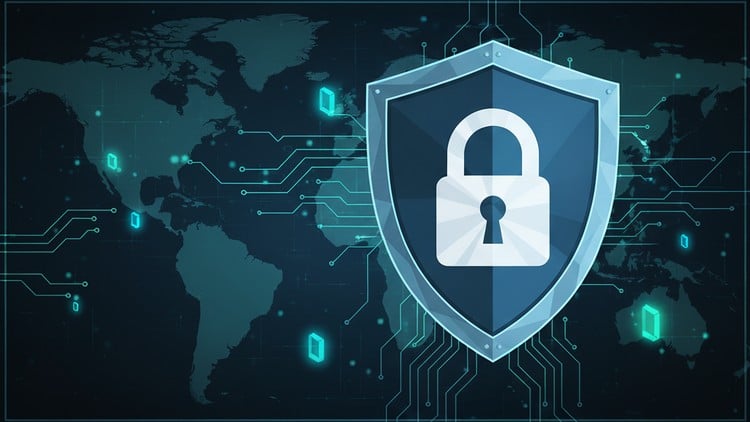
Master Cybersecurity Fundamentals and Prepare with Confidence for the CompTIA Security+ SY0-701 Exam.
👥 19 students
Add-On Information:
Note➛ Make sure your 𝐔𝐝𝐞𝐦𝐲 cart has only this course you're going to enroll it now, Remove all other courses from the 𝐔𝐝𝐞𝐦𝐲 cart before Enrolling!
-
Course Overview
- This course meticulously prepares you with the essential knowledge and practical skills needed to confidently pass the CompTIA Security+ SY0-701 certification exam.
- It is an invaluable resource for aspiring cybersecurity professionals, IT technicians, network administrators, and anyone seeking a strong foundation in information security.
- Our curriculum fully aligns with current SY0-701 exam objectives, ensuring up-to-date training on the latest cybersecurity threats, technologies, and best practices.
- You will delve into core security functions including risk management, incident response, network security, identity/access management, and governance.
- The course facilitates a deep understanding of defensive security concepts and their practical application across various organizational environments.
- Emphasis is placed on building a robust conceptual framework for exam success and a successful cybersecurity career.
-
Requirements / Prerequisites
- A foundational understanding of common IT concepts, including basic networking principles (e.g., TCP/IP, common ports) and operating system functionalities.
- Familiarity with command-line interfaces and basic system administration tasks is beneficial.
- No prior hands-on cybersecurity experience is mandatory, but keen interest and willingness to engage with technical concepts are crucial.
- Reliable internet access and a computer for accessing course materials.
- An eager, proactive attitude and dedication to mastering complex security topics.
-
Skills Covered / Tools Used
- Threat and Vulnerability Analysis: Identify various malware, phishing, social engineering, DoS attacks, advanced persistent threats (APTs), and common system/network vulnerabilities.
- Secure Architecture & Design: Design and deploy secure network infrastructures, including firewalls, intrusion detection/prevention systems (IDS/IPS), network segmentation, and secure device configurations.
- Cloud & Virtualization Security: Understand unique security challenges in cloud environments (IaaS, PaaS, SaaS) and implement secure practices for virtualization/containerization technologies.
- Cryptography & PKI: Apply symmetric and asymmetric encryption, hashing, digital signatures, and Public Key Infrastructure (PKI) for data confidentiality, integrity, and authentication.
- Identity & Access Management (IAM): Configure multi-factor authentication (MFA), single sign-on (SSO), role-based access control (RBAC), and attribute-based access control (ABAC) to manage user identities and permissions effectively.
- Endpoint & Mobile Security: Implement security controls for workstations, servers, and mobile devices, including Mobile Device Management (MDM), Endpoint Detection and Response (EDR), and operating system hardening.
- Data Protection: Utilize Data Loss Prevention (DLP) strategies, secure data handling, and robust backup/recovery methods to protect sensitive information throughout its lifecycle.
- Incident Response: Execute structured incident response procedures (preparation, detection, analysis, containment, eradication, recovery) and understand basic digital forensics principles to react effectively to security breaches.
- Security Monitoring & Auditing: Employ Security Information and Event Management (SIEM) systems for log aggregation and analysis, perform vulnerability scanning, and conduct security assessments to maintain situational awareness.
- GRC Principles: Understand risk management frameworks, develop security policies, ensure regulatory adherence (e.g., GDPR, HIPAA, NIST), and perform business impact analysis.
- Secure Software Development: Integrate security into the software development lifecycle, address common web application vulnerabilities, and promote secure coding principles.
-
Benefits / Outcomes
- Achieve a comprehensive and practical understanding of core cybersecurity principles, preparing you thoroughly for the CompTIA Security+ SY0-701 certification exam.
- Gain the confidence to identify, analyze, and effectively mitigate a wide array of cyber threats and vulnerabilities across various technical environments.
- Develop the foundational skills required to implement and maintain robust security controls for networks, systems, applications, and data within an organization.
- Position yourself for entry-level to mid-level cybersecurity roles such as Security Administrator, Security Specialist, Junior SOC Analyst, or IT Auditor in a high-demand field.
- Enhance your professional credibility and marketability, opening doors to diverse career advancement opportunities within the rapidly growing cybersecurity industry.
- Cultivate a critical “security mindset,” enabling you to approach IT challenges with an inherent understanding of potential risks and preventative measures.
- Establish a solid educational baseline that serves as a springboard for pursuing more advanced cybersecurity certifications and specializations in the future.
-
PROS
- Comprehensive Exam Coverage: Thoroughly covers all official CompTIA Security+ SY0-701 exam objectives, ensuring complete preparation.
- Enhanced Career Prospects: Significantly boosts your resume and career trajectory in the high-demand cybersecurity sector.
- Globally Recognized Certification: Prepares you for an industry-standard credential that validates your foundational security expertise.
- Practical Skill Development: Emphasizes real-world application of security concepts, moving beyond theory to build actionable skills.
- Up-to-Date Content: Delivers the latest information on cybersecurity threats, technologies, and best practices relevant today.
- Foundation for Advanced Learning: Creates a robust base for pursuing more specialized certifications and advanced roles.
-
CONS
- Significant Time Commitment: Requires substantial dedicated study time and self-discipline to absorb complex technical information and adequately prepare for the challenging certification exam.
Learning Tracks: English,IT & Software,IT Certifications
Found It Free? Share It Fast!